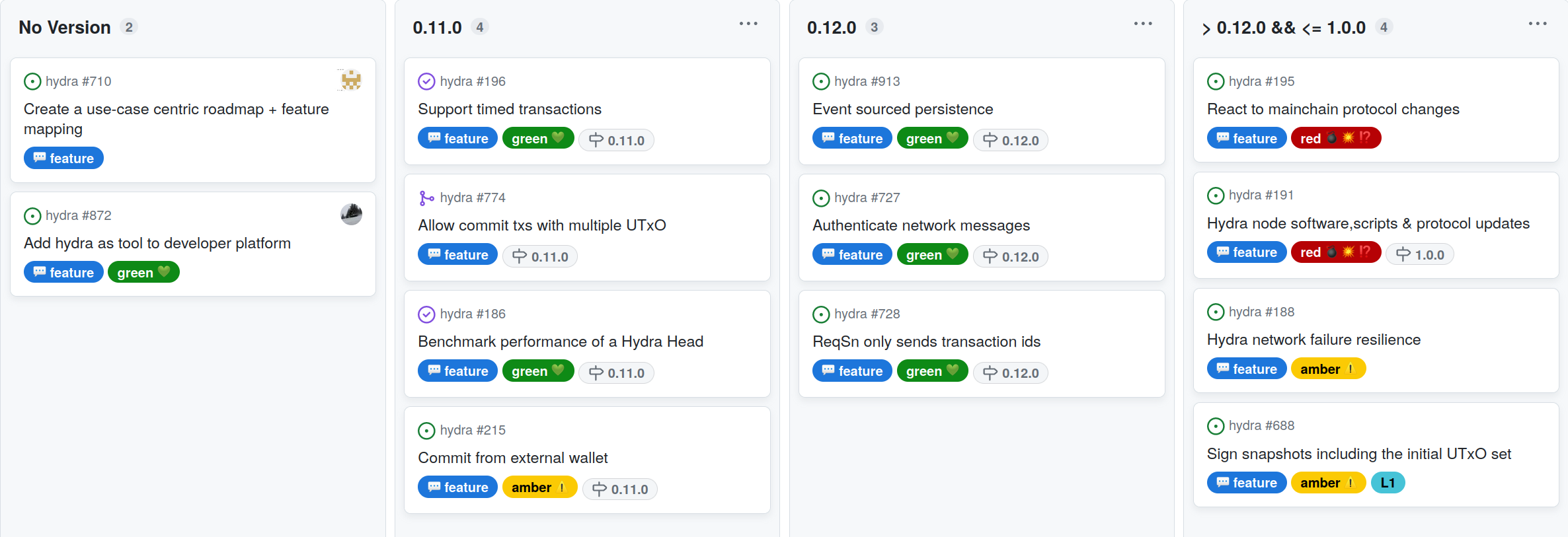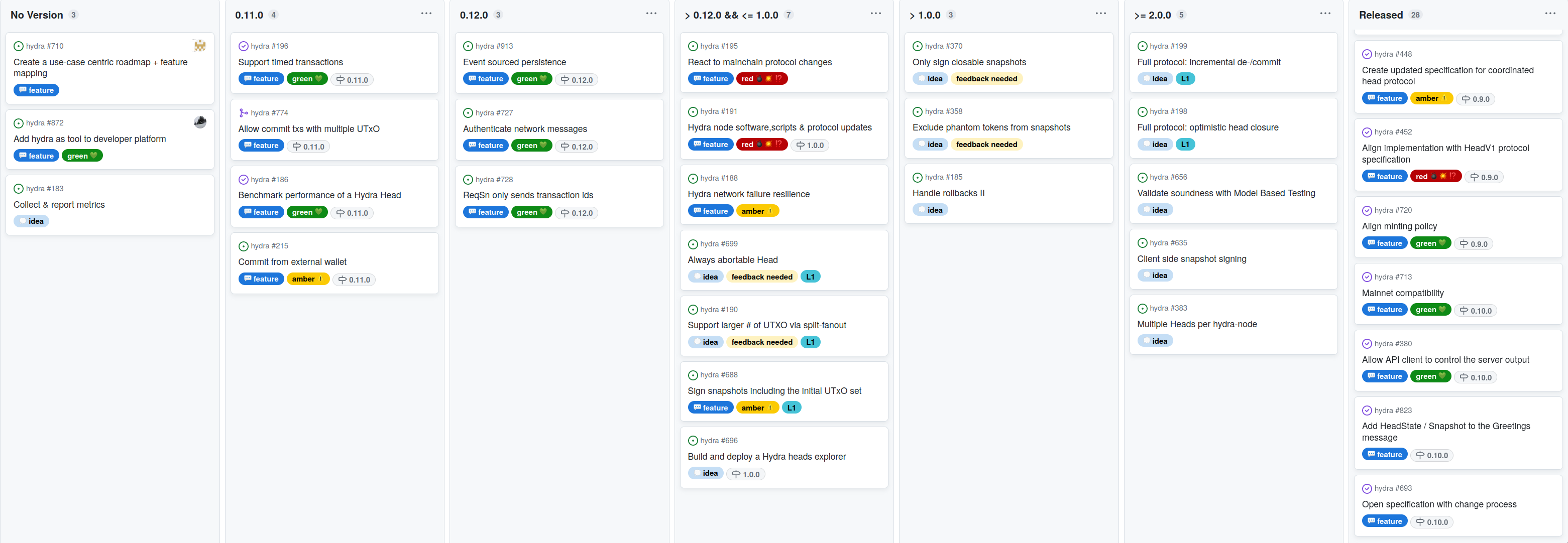This report summarizes the work on Hydra since May 2023. It serves as preparation for the monthly review meeting (see slides and recording), where the team updates project stakeholders on recent developments to gather their feedback on proposed plans.
Roadmap
While there was no release this month, the team implemented several notable features, which will be released soon as version 0.11.0:

Notable roadmap updates
-
Realized allowing commit txs with multiple UTxO #774 as a dedicated roadmap item separate from the related commit from external wallet #215 (which grew too big).
-
Revisited off-chain performance by doing benchmarks #186. Identified a bottleneck, groomed and planned a follow-up performance improvement feature for Event sourced persistence" #913
-
Plan to release 0.11.0 without Authenticate network messages #727 to deliver enabling features earlier.
-
API improvements and exploring batched transactions on L2 showed that ReqSN only sends transaction IDs #728 is in demand, front-loads further API changes and is estimated to be a low-hanging fruit.
-
Reprioritized items in
<= 1.0.0column, to do items with on-chain protocol impact earlier and not much feedback has been received on snapshotting items. In fact, if Support larger # of UTXO via split-fanout #190 is done slightly differently, that should avoid some of the problems of impossible to finalize snapshots.

Development
Issues and pull requests closed since last report
This month, the team worked on the following:
Commits with multiple UTXO #774
One of the early adopting projects is exploring how to move scripts from layer 1
to layer 2. For that purpose, it was necessary to not only commit the actual
script UTXO, but also a "regular" UTXO holding only ada to be used as collateral
(the cardano-ledger always requires collateral although it would not be
necessary on a layer 2).
To enable this, the specification and on-chain protocol needed updating. Before a protocol participant could commit zero or one UTXO, which changed now to a list of UTXO. As the specification is now part of the repository, it could be kept consistent within the same pull request.
Despite being a breaking change, leading to new Hydra script hashes to be published and used starting with version 0.11.0, this change was surprisingly easy to do and demonstrated the amenability of the Head protocol and the system architecture.
Commits from external wallet #215
The team started to mark fuel some time ago as it was an easy workaround to
distinguish UTXOs that can be committed into a head apart from regular outputs
holding ada to pay for fees - the so-called fuel. However, this required users
to "send funds" they want to commit first to the hydra-nodes internal wallet
and involved additional steps in tagging such outputs with a special datum hash
To commit from external wallets, a new API endpoint was introduced for the
purpose of drafting a commit transaction. The clients would request such draft
transaction by sending a POST request to /commit and the hydra-node would
respond with a transaction already authorized by the internal wallet. If the
commit involved user funds (empty commits are still possible), then the client
application would need to sign the transaction using the corresponding signing
key. Also, submitting this transaction has shifted from hydra-node to the
client.
This removes direct custody of hydra-node over user funds since clients can
now use whatever key they own, not known to the hydra-node, to do a commit
step and no single hydra-node has access to user funds used in the Head
protocol.
Within this work package, marking fuel became deprecated and all UTXOs owned by the internal wallet are considered fuel. Fuel marking will be completely removed in the future. Furthermore, a good old HTTP-based API is now used for the new query (so far it was only WebSocket-based), which prompts a potential shift to using OpenAPI as API specification since AsyncAPI does not describe synchronous requests well.
Benchmark performance of Hydra Head #186
Low confirmation time is a key feature of Hydra Head protocol and is needed for some use cases. The existing end-to-end benchmarks have been revived and tailored for a baseline scenario, one with a single hydra-node and a single client. While this scenario is not representative of target deployments, it's interesting as it gives us an upper bound on the performance of a Hydra Head network.
The results have been somewhat disappointing, and further investigations lead to a few insights:
- There was a misconfiguration in the RTS of the hydra-node executable which was therefore not taking advantage of parallelism
- We identified the main bottleneck to be persistence of the node's state, which is currently done by overwriting a single file with the JSON content of the full state on state change which is pretty inefficient. As a consequence, the team will work on improving the persistence strategy as described in this ADR
- More benchmarks:
- The aforementioned End-to-end benchmarks,
- Ledger Micro-benchmarks as a comparison basis.
Operating hydra nodes
As a "dogfooding" exercise, the Hydra team is operating a Hydra Head
on mainnet on top of which is running our hydraw application.
The Head protocol got stuck a couple of times and
post-mortem investigations lead to a few improvements in how to
operate a hydra-node and network:
- Better reporting on the version of executable
hydra-nodeandhydra-tuiwhich now report the Git SHA1 at which they were built - Reduction in the volume of logs emitted by hydra-node by removing
some chatty network-related logs and using ids to link
Begin/Endpairs - Rework the log-filter tool to provide timings for various events and effects keyed by transactions
Community
Hydra hackathon / workshop
The Hydra team is considering holding a workshop at/around Rare Evo at the end of August and is in contact with the event teams at IOG and the Rare Evo organizers. The concrete format, scope and agenda is still a bit unclear as we are contemplating whether to do a workshop/tutorial style or rather a introduction + challenge setting event. If it does not work out for Rare Evo, we will find another event or do it ourselves.
If you are reading this and would be interested in joining such an event please drop us a line on discord or DM @ch1bo! Ideally along with some thoughts on preferred format or what you would be interested in.
Hydra for Auctions contributions and closing of project
One of the Hydra lighthouse projects is slowly coming to an end. The collaboration project between IOG and MLabs on using Hydra for auctions is currently finalizing documentation and creating demonstration running the whole thing on a public testnet. Although the demo video was not available at the copy deadline of this report, watch this space for more about this next month.
The project yielded multiple github issues containing ideas and sparked great discussions on improving Hydra like reported last month. It is also the first project which demonstrates how to move smart contracts from the layer 1 (L1) to the layer 2 (L2)! Overall it is a great example of establishing crucial state on L1 and achieving scalability through Hydra as L2.
The code is fully open source and available on Github hydra-auction.
Conclusion
The monthly review meeting for May was held on 2023-06-21 via Google Meet with these slides and here is the recording.
It was a fairly straight-forward month and consequently unexciting review meeting this month. Unfortunately, we could not release 0.11.0 yet, but we wanted to get the quite significant change of supporting commits from external wallets done first. This feature in particular was more involved than expected, but as the demonstration in the meeting showed, we are in the final stages of getting this over the line.
Besides some nice findings to potential performance improvements for layer 2 transaction processing, there was not much to announce this time around. Behind the scenes, however, there have been great progress on the Hydra for Payments project and the next updates are going to be more interesting again.
Despite holiday season approaching, we will march on, steadily adding features and enabling more and more use cases to scale through Hydra.

